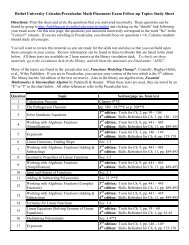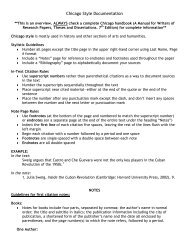here - College of Arts & Sciences - Bethel University
here - College of Arts & Sciences - Bethel University
here - College of Arts & Sciences - Bethel University
You also want an ePaper? Increase the reach of your titles
YUMPU automatically turns print PDFs into web optimized ePapers that Google loves.
I prefer depth over breadth <strong>of</strong> argumentation. I have grown weary <strong>of</strong> unwarranted, unevidenced<br />
claims. The “capitalism is evil, the state is evil, DUH!” lines <strong>of</strong> argumentation<br />
that <strong>of</strong>ten turn up in kritik debates are a key <strong>of</strong>fender. I may agree with your argument,<br />
but making sweeping generalizations and claims popular with many in the community<br />
doesn’t relieve you <strong>of</strong> the burden <strong>of</strong> pro<strong>of</strong>.<br />
I prefer that questions <strong>of</strong> theory be resolved during the round. My default is to view<br />
procedurals as questions <strong>of</strong> competing interpretations. Demonstrating in-round abuse will<br />
<strong>of</strong>ten lower my threshold for voting on a procedural/theoretical objection but isn’t<br />
necessary to win my ballot. My personal views on theory tend to be “liberal,” meaning<br />
permissive. If you think something is unfair, point it out and explain why I should<br />
consider it in my decision. If you don’t, chances are high that I’ll let it slide.<br />
Rebuttals should weigh competing arguments/positions and then impact them to the<br />
ballot. Put differently, I want you to tell me why you’re winning a specific portion <strong>of</strong> the<br />
flow and why controlling that portion <strong>of</strong> the flow wins you the debate. As a corollary, I<br />
greatly appreciate strategic issue selection. You don’t need to win every argument; you<br />
need to win a combination <strong>of</strong> arguments that make a persuasive case for your side. Put<br />
differently, don’t go for everything. Take a few risks, have the discipline to jettison the<br />
positions you don’t need, and then go for broke.<br />
I don’t listen to new arguments in rebuttals, but call points <strong>of</strong> order to be on the safe side.<br />
Have fun, learn something, and don’t prevent others from doing the same.<br />
West, Tim<br />
Hired<br />
Background <strong>of</strong> the critic:<br />
Debated for four years for Texas Tech 2003-2007; volunteer coach with Texas Tech<br />
Approach <strong>of</strong> the critic to decision-making (for example, ad<strong>here</strong>nce to the trichotomy,<br />
stock-issues, policymaker, tabula rasa, etc.):<br />
I believe that debate is a game played by the debaters. My default role as a critic will be<br />
to evaluate all argumentation that the debaters put on my flow unless I am instructed to<br />
do otherwise. I strive to be as tabula rosa as I possibly can.<br />
Relative importance <strong>of</strong> presentation/communication skills to the critic in decision-making<br />
:<br />
188
















